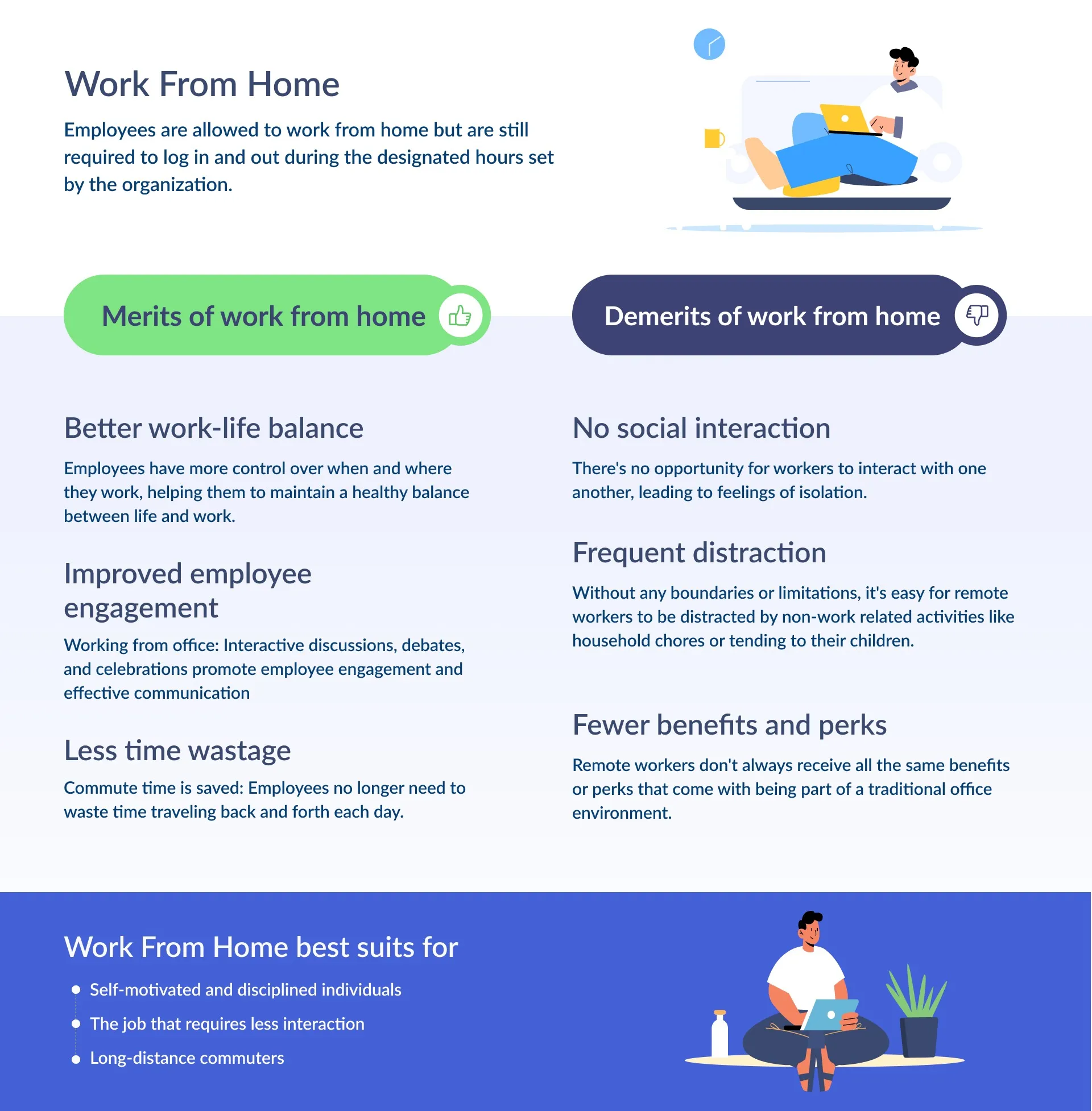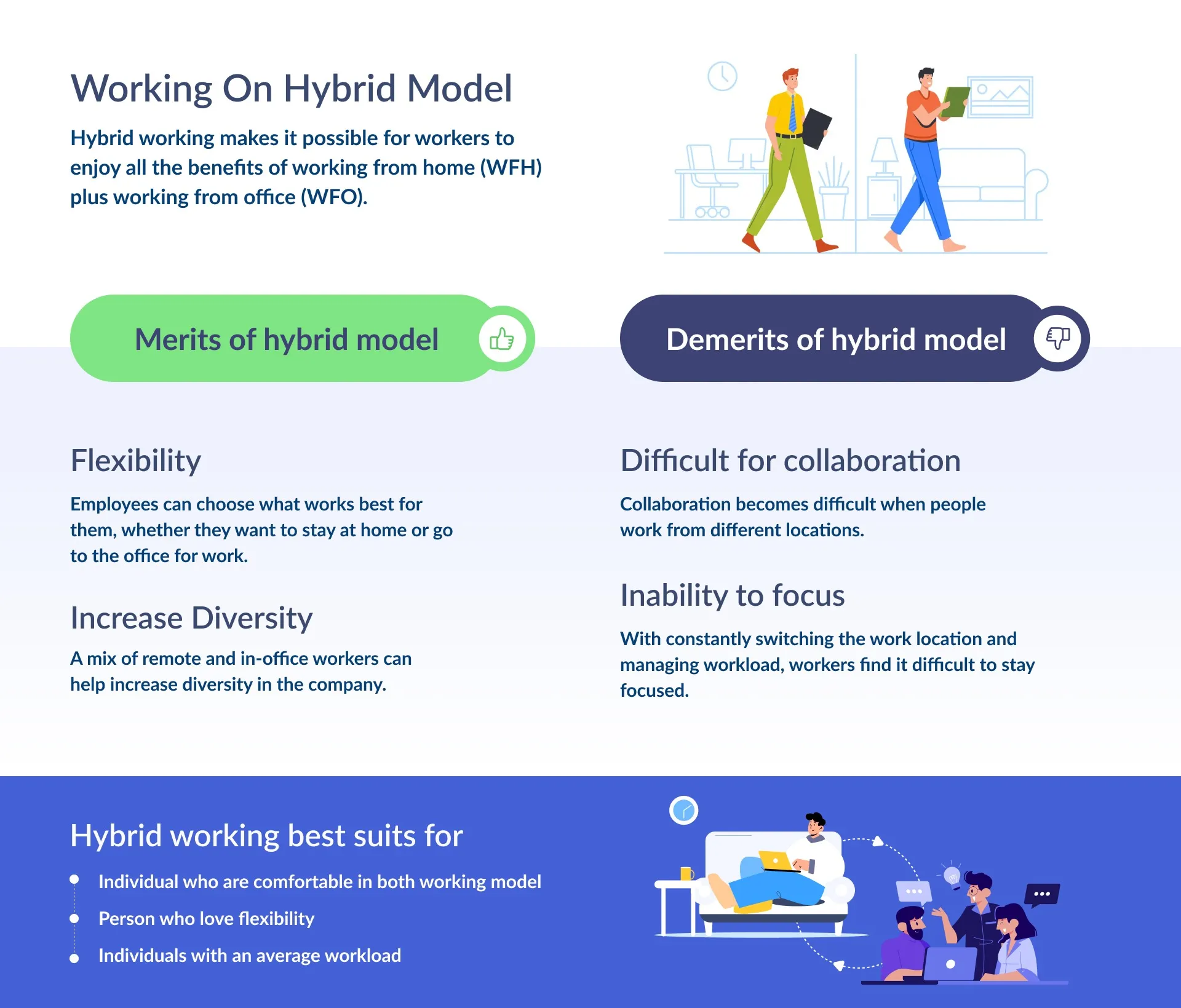Table of Contents
In today’s rapidly changing world of technology, employers are facing more challenges than ever to keep up with the demands of their consumers and employees. One of these challenges involves understanding which working conditions best suit the software developers and how to manage them accordingly.
There are three main options when setting up a work environment/mode for developers: working from the employer’s office, working remotely from one’s own house, or working in the hybrid model, which combines both. Let’s address this hot topic on work from home vs work from office vs hybrid.
While all the approaches have advantages and disadvantages, the key is understanding which will be most effective for your team and culture.
In this blog, we will help you analyze the pros and cons of the three models and offer suggestions for managing your employees in any given situation. We will also share different tools and software for each work environment so you can easily manage any work style that best fits your development team and business goals.
So without any further ado, let’s start with introducing each of the three types of working environments for your software developers.
Work From Office
In this working model, the employees must be physically present at the Office to complete their operations and serve the company. They must come into the Office and stay until the designated hours, for example, 9 hours daily.
Working from home brings various benefits to the employers, such as
- Employers See Better Attendance,
- High-Quality Results,
- Enhanced Performance And Efficiency,
- Better Communication With Each Other
- Higher Project Completion Rate.
Check the below infographic for work from office advantages and disadvantages:

Hits And Misses Of Working From The Office
Here are some of the major merits and demerits of working from the Office
Merits
1) Better Quality Work – One of the pros of office work is that employees can collaboratively execute tasks using teamwork. Teams are encouraged, which helps team members build stronger relationships with each other to execute better-quality work. Moreover, employees are more easily available to the resources, which helps them get their jobs done more efficiently.
2) Better Communication- According to multiple research studies, individuals who work from the Office have better communication with each other than remote employees. This is because they are available for face-to-face interaction, which improves the discussions and helps the team perform better for the company’s betterment.
3) Less Chance Of Missing Important Deadlines- In addition, the risk of missing deadlines is much less likely to happen among office employees because of the constant and daily interactions in the office. Team members are held accountable and are dependent on each other, ensuring that work gets completed on time and fulfilling any commitments.
4) More Organized And Productive Work Environment– The office work environment allows for better organization, enabling tasks to be done systematically. Moreover, employees are less likely to be distracted and more focused on their work than working from home. This allows for greater productivity levels which can help in achieving better results
Demerits
1) Lack Of Flexibility- Despite technological advancements, making an office-type setting completely flexible is impossible. Most of the time, employees must be in the Office from 9 am to 5 pm to complete their shift. This rigidness of the working hours can often be mentally draining for employees that can lead to a decrease in performance and productivity
2) Increased Stress & Burnout– Working in an office environment can often lead to increased stress levels due to demanding deadlines, workload, and pressure from bosses. This can result in employees feeling fatigued and overwhelmed, that sometimes lead to burnout and lowered productivity
3) The Challenge Of Time Wastage In Commuting– With office work, you are expected to travel to the workplace daily. This can be cumbersome and time-consuming in areas with huge traffic or public transport issues. As such, many hours of productive time are wasted in commuting which cannot be avoided and affect the overall efficiency.
Factors To Consider While Opting For Work From The Office-
1) Reasonable Workspace: An ideal workspace should have enough room to accommodate all team members with reasonable resources.
2) Appropriate Technology: Adequate technology should be available so everyone can conveniently and efficiently work from the office.
3) Proper Safety Measures: The safety of employees must always be taken into consideration when opting for work from the Office, such as access to medical and emergency service, sanitization of frequently touched objects and surfaces and regular temperature checks, etc
Working from the Office works best for-
1) Working from the Office is better than working from home for organized and structured people.
2) Individuals who require one-on-one communication and collaboration to complete their work.
3) Individuals who have to spend less time commuting
4) Persons who are fond of working in a workplace culture
As we have now learned about how Work From Office is quite beneficial to choose as your working model, now let’s explore
Working From Home
In this method, employees can complete their assigned tasks from the comfort of their homes instead of coming into the Office, saving them time, energy, and additional effort of commuting.
This energy can be channelized to complete projects and meet deadlines with higher efficiency and productivity. However, working from home might also come with its own set of drawbacks.
Let’s check out

Hits And Misses Of Working From The Home
Merits
1) Better Work-Life Balance– Employees who work from home can maintain a better work-life balance as It’s much easier to manage their family and personal responsibilities while keeping up with their work commitments. This helps them to be more productive and efficient and improves their overall mental and physical well-being.
2) Improved Employee Engagement– Companies that allow work from home often report an increase in productivity (42%) and efficiency (38%) among their workers as working from home delivers more flexibility in employees’ daily schedule, resulting in higher engagement and morale
3) Cost Savings- One of the biggest advantages that working from home offers companies and employees is saving financial resources. Companies save money on office rent and other associated costs like maintenance, utilities, etc., while employees don’t have to bear the expense of traveling.
4) Decreased Burnout & Fatigue– Working from home allows employees to take care of their well-being and limit their time in high-stress situations helping them to avoid feeling overwhelmed and burnt out, which can lead to a decline in work performance.
Demerits
1) No Social Interaction- Working from home can be lonely and isolating, as you are not interacting with colleagues or clients. This can leave you feeling isolated and disconnected from the workplace, peers, and teams.
2) Frequent Distraction- The home is filled with distractions, which can be difficult to ignore when trying to focus on work. From the television or radio to family members, pets, or even your thoughts, working from home can be challenging if you don’t have the discipline and structure of an office environment.
3) Lack Of Tools & Technology- Working from home can be difficult if you don’t have the right tools and technology. This can include a stable Internet connection, reliable access to software programs and other necessary materials, or even the ability to print documents.
Also read: 11 Remote Working Tips To keep Remote Employees Engaged and Productive
Factors To Consider While Choosing Work From Home
1) Suitable Workplace Setup: An organized and comfortable workspace setup is key to productivity while working from home. An organized workspace with the right equipment can help you perform better.
2) Technology: A strong internet connection is crucial when considering working from home. Technology is necessary to effectively collaborate and stay connected with colleagues or employers.
3) Support: It’s essential to have access to reliable support when working from home. Check what kind of customer service and technical support the employer provides and ensure they have reliable communication methods if needed.
Working From Home Works Best For-
1) If we consider working from home vs. Office, self-motivated and self-disciplined individuals will be better suited for working from home.
2) The type of work that does not require as much interaction.
3) Employees who have to commute longer distance
4) Employees with all the essential resources for completing the work such as Wifi, internet, laptop, and other necessary equipment.
Hybrid Working
Hybrid remote working offers the best of both worlds, combining elements of working from home and in the Office. This enables companies to enjoy the benefits of physical presence while providing employees with a flexible schedule or opportunity to work remotely.
Employees can sometimes work from home and sometimes visit the Office to work, which enables flexibility and provides a healthy balance between work and life that leads to improved performance and better outcomes.

Hits & Misses Of Working In A Hybrid Model
Here are some of the major merits and demerits of working in a hybrid model
Merits
1) Flexibility- A hybrid remote working model is flexible because it can be tailored to suit the employee’s needs. For example, an individual may work remotely for part of the week and in the Office for another part, giving them the flexibility to balance their work and personal lives better.
2) Increase Diversity– An employer who embraces this working mode can increase their chances of hiring talent with diverse backgrounds, experiences, and perspectives, which results in a more rounded team with more innovation and ideas.
3) Improved Productivity- When individuals have control over their work schedules and environments, they will feel motivated to perform better. With increased motivation comes increased productivity, meaning there’s less room for procrastination and more room for effective work.
Demerits
1) Difficult For Collaboration- Collaboration is a key component of every professional, but a team member who works on hybrid bases might find it challenging to discuss concepts, share feedback, and brainstorm solutions with their teammates, as different employees may be working from different locations that can lead to difficulty in collaboration.
2) Inability To Focus- Employees who work in the hybrid system often complain about the inability to focus on their daily projects as they don’t have a fixed schedule. Working some days from the Office and others from home can exhaust the worker and make it hard for them to maintain their work-life balance, which causes decreased productivity and higher turnover rates.
3) Employees Can Feel Disheartened For Not Getting Their Preferred Working Mode- It varies from employee to employee in terms of their choice of how they would like to work.
Some of them may want to work on an alternative day from home, while others might prefer complete work from the Office. They may feel dishonored if they do not get alternative days for such a working model, leading to low working efficiency.
Factors To Consider While Choosing A Hybrid Working Model
1) Flexibility- Before choosing a hybrid working model, you should check how flexible your company is in providing the working model you need.
2) Technology- You need to know which type of technology will be delivered by your organization to support such a working model.
3)Work Scheduling- You should always check in with your organization regarding your schedule of hybrid working, as with complete knowledge, you will be able to manage your workflow better.
Hybrid Working Is Best-
1) For employees who love remote work yet value the benefits of being in the Office.
2) When a company doesn’t have enough space to accommodate everyone and still wants to allow employees to work from home vs. the Office both.
3) The hybrid system is a good option for one who wants to be flexible in their work.
What’s The Best Working Model For Your Business? Try These Three Approaches To Find Out.
1) What Type Of Culture Do You Want To Build-
The culture you want to build is key to deciding which type of working model will work best for you. A hybrid remote work model may be your best option if you want flexible working schedules. An office setting could be better suited if you are looking for a culture with high productivity and require tight deadlines. Working from home could be the answer to keep overhead costs low.
2) What Industry Do You Work With –
It’s also important to consider what kind of industry you work with when deciding where your workforce should be. You can try different working models per your industry operations and continue with the one that suits you better.
3) The Size Of Your Company –
Your business type can impact whether you work from home, an office, or a hybrid model. Smaller companies may benefit from employees working remotely and avoiding paying for office space.
On the other hand, larger companies that have higher budgets but still want to create a collaborative culture may find the traditional working from the Office the best option. So according to your company size, you should choose the option that is most suitable for you.
With these three things in mind (your company’s culture, industry, and size), it becomes much easier to decide on the best way for you to work that will take your business to the next level.
Three Tools Will Help You Manage Your Workforce And Any Working Conditions.
1) Using Project Management Tools- With project management tools at your disposal, you can be confident in your team’s goals because everyone knows what’s going on. You can use such tools to manage your project cost, assigns tasks, Track progress, and much more with ease
2) Using Employee Activity Tracking Software- It doesn’t matter if you have a physical office or remote workers. Monitoring their online activities and screen time can be helpful.
These software solutions allow managers to keep tabs on activities that are performed by employees, which includes the content they’re viewing, websites they are visiting, and apps they are using during working hours, helping employees to ensure work tasks are being completed during work hours.
Employee activity tracking software allows for transparency among employers and employees alike and promotes trust among all company members working under any mode.
3) Using Chat & Video Conferencing Tools – Lastly, utilizing chat and video conferencing tools will allow for constant communication between co-workers who may not even be in the same state or country. With such a tool, there won’t be any excuses when it comes to getting work done, as it will allow employees to share ideas and collaborate with ease
Final Thoughts
The decision of where to work – whether from home, in the office, or in a hybrid mode – depends on many factors. Hybrid mode meaning a blend of both in-office and remote work, offers a balance for many. Working at home provides flexibility and a less pressured atmosphere for some. For others, the structure and accountability of an office environment are more conducive to productivity. Ultimately, the ideal work arrangement is the one that best suits individual needs and preferences.
Ultimately, it’s up to you where you want your team members working, and it’s up to you to determine which approach best suits your mutual needs.
Thank you!!













